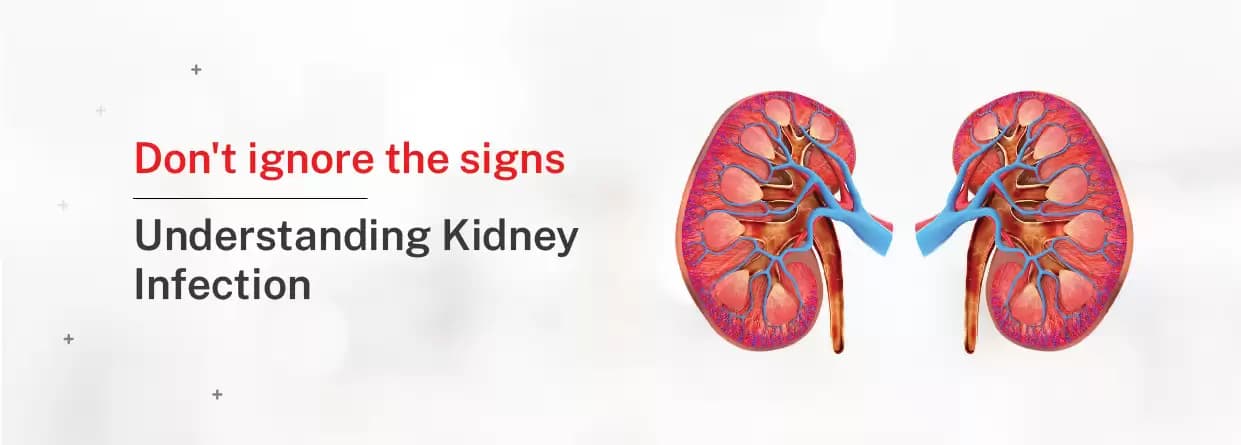
Kidney infections, also called pyelonephritis, is a common but sometimes misidentified condition affecting millions of people across the globe. They often develop from untreated urinary tract infections caused by bacterial infiltration into the kidneys.
Kidney infections, also called pyelonephritis, is a common but sometimes misidentified condition affecting millions of people across the globe. They often develop from untreated urinary tract infections caused by bacterial infiltration into the kidneys. Kidney infections can affect anyone, however, as per studies, it is found that women are more vulnerable than men; almost 10% of females experience kidney infection at some point in their lives. Some factors increasing the susceptibility to kidney infections are urinary blockages, compromised immune systems, and particular medical procedures. Immediate diagnosis and treatment are significant to prevent serious consequences like renal damage or systemic infections. The fact that they are common highlights how important it is to treat urinary health.
If you are experiencing kidney infections like lower back pain, fever, or chills, book your appointment with one of the best kidney specialists in Jaipur at CK Birla Hospitals.
This writing guide will involve a comprehensive discussion on kidney infection and everything such as symptoms, causes, diagnosis, and treatment options. However, please note that this is for informational purposes and doesn’t replace the relevance of a doctor’s consultation.
A kidney infection is considered to be among the serious conditions characterized by bacterial intrusion into the kidneys. Kidney infections often stem from untreated urinary tract infections (UTIs) causing symptoms like fever, back pain, nausea, and frequent urination. The primary contributing factors of kidney infection are urinary obstructions, jeopardized immune systems, and certain medical procedures. Timely diagnosis and treatment play an important role in averting complications such as kidney damage or bloodstream infections. Comprehending kidney infection involves identifying its symptoms and dealing with underlying causes for effective management and recovery.
Determining the symptoms of kidney infection is vital for early diagnosis and treatment, as untreated infections cause serious complications like kidney damage or bloodstream infections.
Symptoms of kidney infection in women differ depending on individual anatomy. However, common symptoms involve:
Several causes lead to kidney infection such as:
Kidney infections are diagnosed by involving physical examination, diagnostic testing, and an assessment of medical history. Healthcare experts initiate the diagnosis by assessing symptoms such as fever, back pain, and urine problems. To confirm the diagnosis, they perform a physical examination to identify the symptoms like kidney-related pain. Urinalysis is involved in identifying infection symptoms by taking the urine culture to pinpoint the specific bacteria, and imaging tests like CT or ultrasound to view the kidneys and urinary system. Blood tests are also involved in certain cases to evaluate kidney health and overall well-being.
Treatment for kidney infection is given to the patient depending on their symptoms and risk factors. Here are the treatment options usually involved in treating kidney infections:
If you want to ensure the prevention of a kidney infection, then make sure to follow these steps:
Kidney infections are found to be among the serious conditions that require immediate diagnosis and treatment to avert complications. Patients can take proactive steps to protect their urinary tract health by identifying the symptoms, understanding the underlying causes, and involving preventive measures. One must seek medical attention at the first sign of infection, maintain proper hygiene practices, stay hydrated, and manage underlying health conditions to mitigate the risk of kidney infections and promote overall well-being.
Written and Verified by:

Dr. Devendra K. Sharma is Director of Urology & Renal Transplant Dept. at CK Birla Hospital, Jaipur with over 22 years of experience. He specializes in renal transplantation, laparoscopic urology, female urology and paediatric urology.
Similar Renal Sciences Blogs
Book Your Appointment TODAY
© 2024 RBH Jaipur. All Rights Reserved.